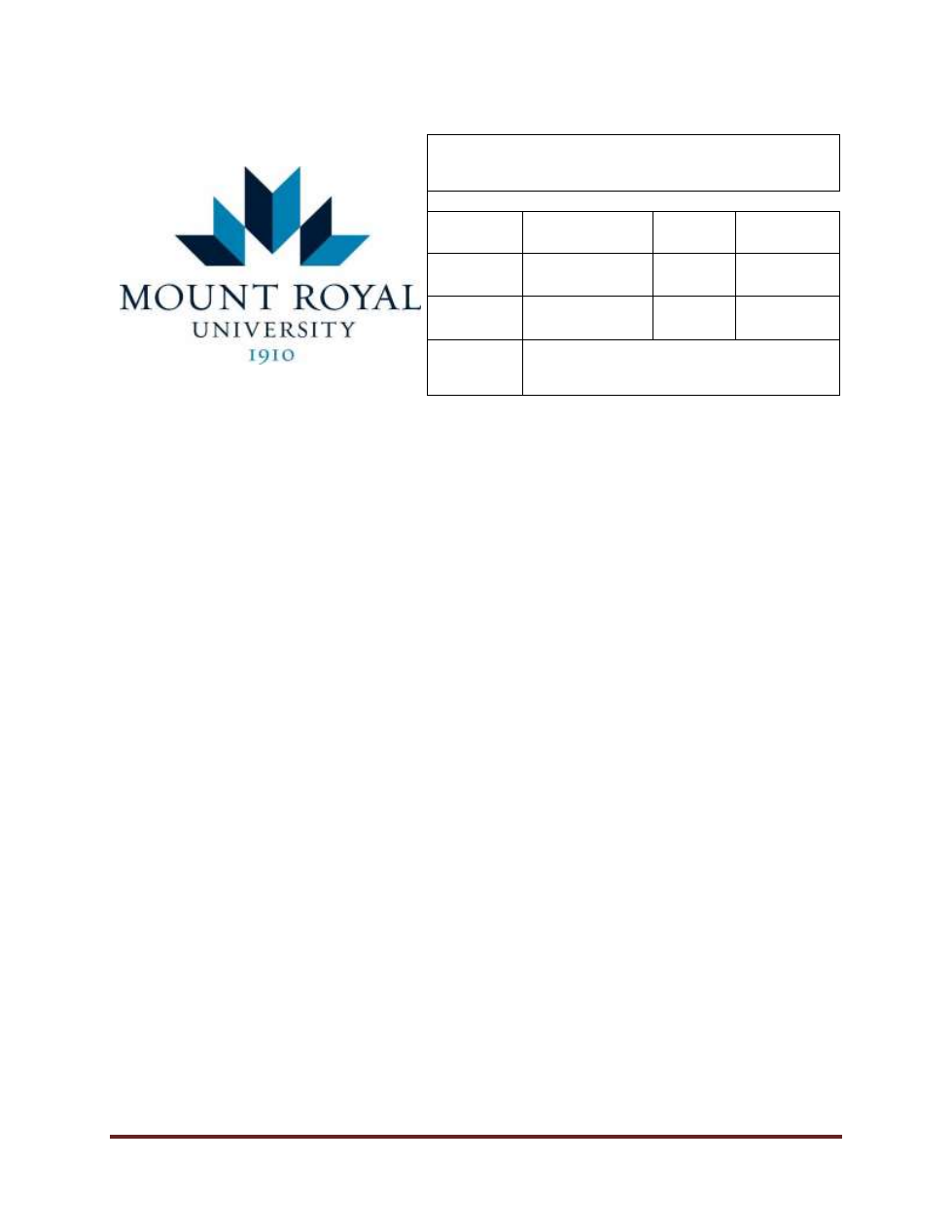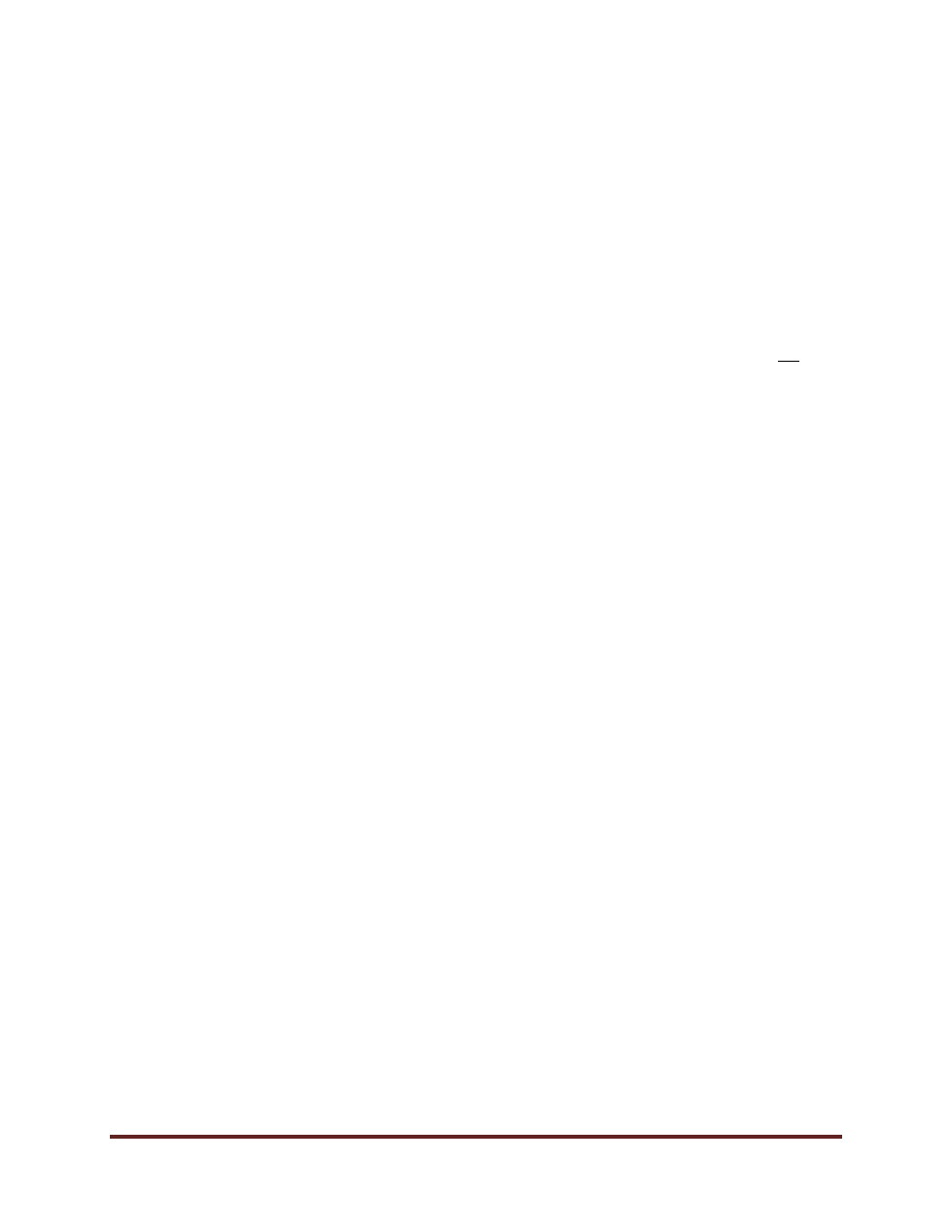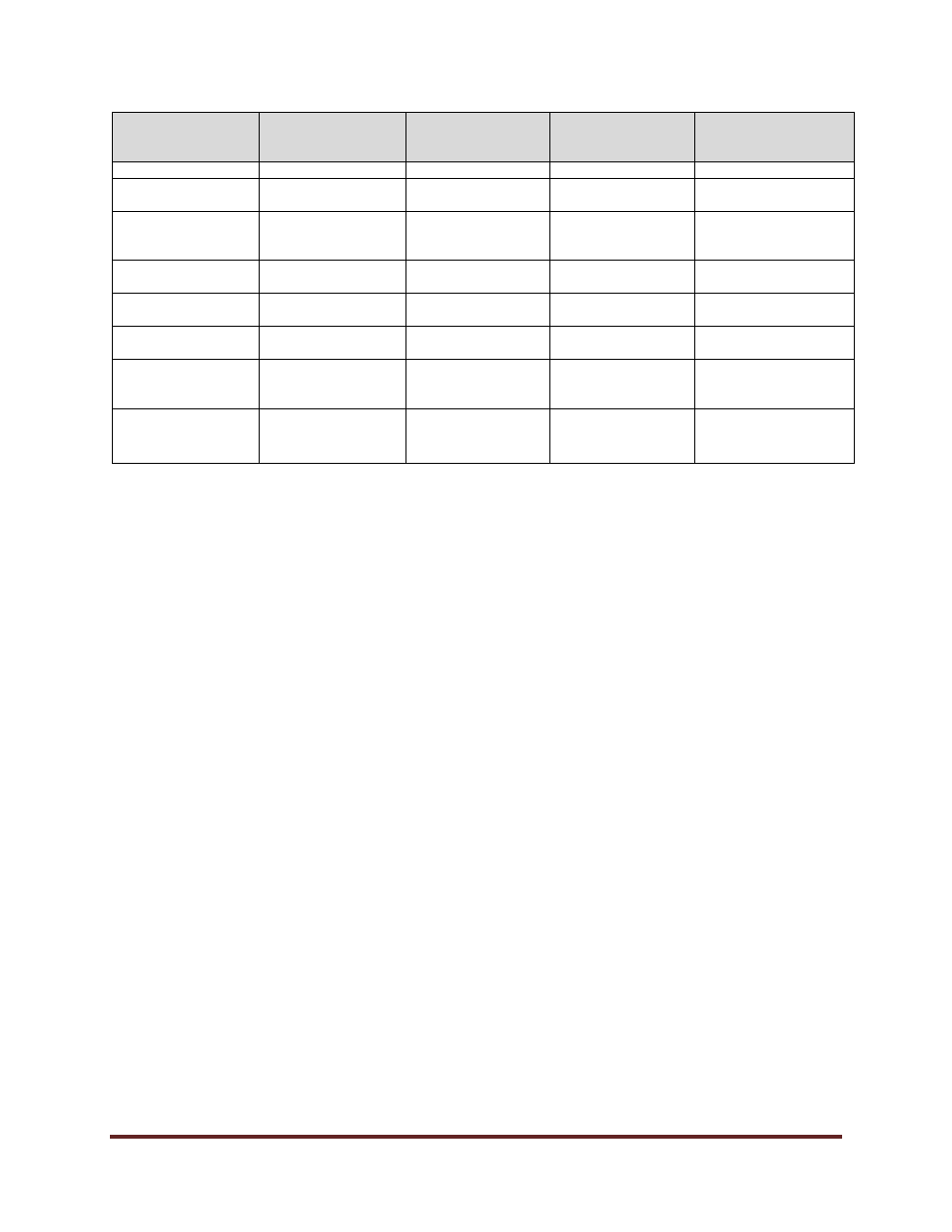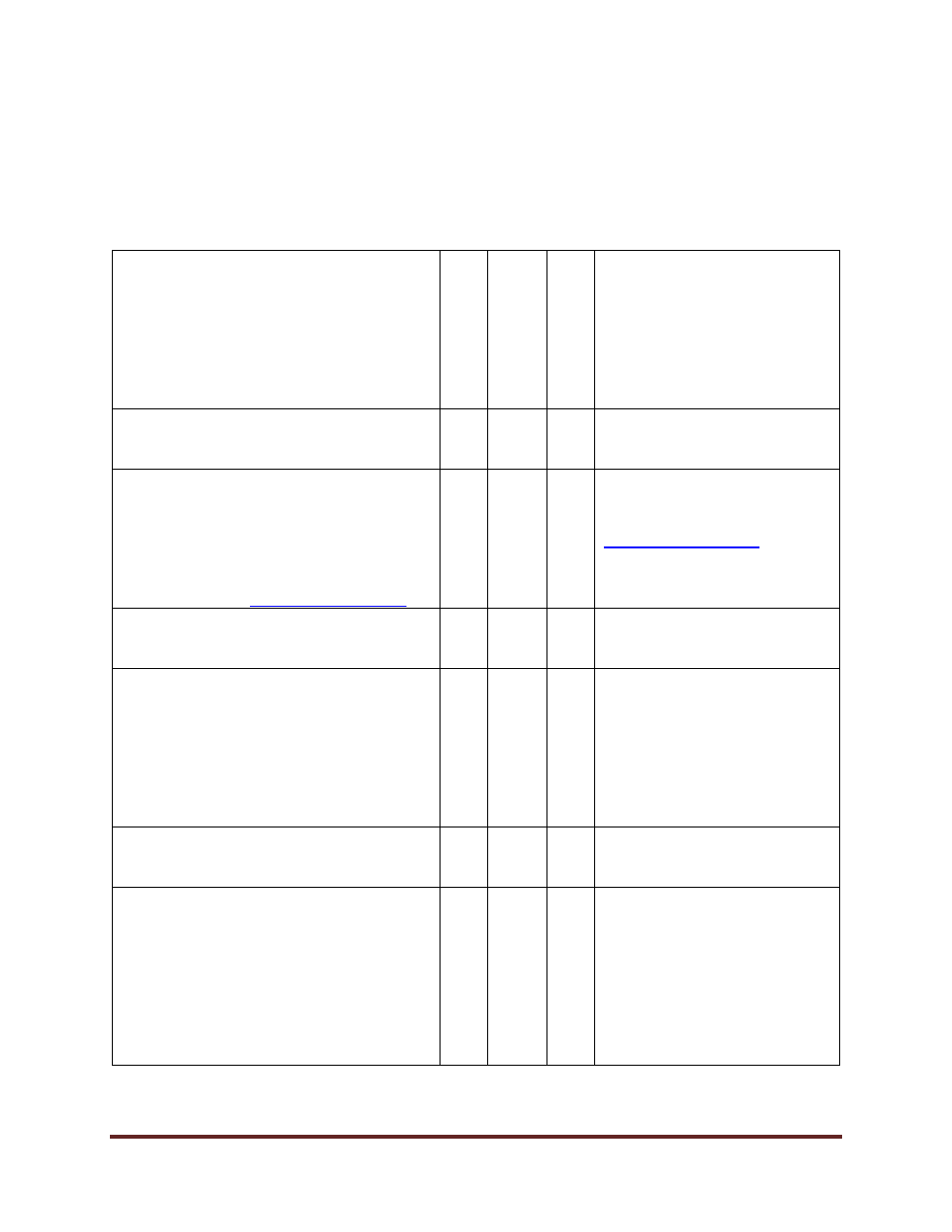
Travel and Expense Reimbursement Procedures – February 13, 2012
Page 1 of 21
TRAVEL
AND
EXPENSE
PROCEDURES
Procedure
Type:
Management
Initially
Approved:
January 1,
2011
Procedure
Sponsor:
VP, Finance &
Administration
Last
Revised:
February 13,
2012
Administrative
Responsibility:
AVP, Finance and
Commercial
Operations
Review
Scheduled:
April 2025
Approver:
Executive Leadership Team
A.
OVERVIEW
The Travel and Expense Policy requires that all claims be reasonable, reflect prudence, good
judgment, due diligence and be defensible to an impartial observer. The impartial observer to whom
we, as a public institution, can anticipate having to defend the reasonableness of our claims may
include: auditors, internal or external, representing any of the funding organizations that support
activities at the University and Provincial level; members of the public; and any form of media who
wish to scrutinize specific activities by query or through the means offered in the Government of
Alberta's Freedom of Information and Protection of Privacy Act.
B.
PURPOSE
Based on the principles stated in the Travel and Expense Policy, the purpose of this document is
to ensure fair treatment of employees required to travel and incur expenditures on behalf of the
University. The provisions contained in this document are mandatory and provide for the payment
of reasonable expenses necessarily incurred on University business and to ensure employees are
appropriately reimbursed; and, direct the appropriate considerations and authority for travel and
related expenditures, taking into consideration the expectations of a publicly funded institution.
C.
PROCEDURES
1.
ADMINISTRATION
1.1
Authorization
a.
The Expense Approver of the Employer have the responsibility to
authorize and determine when business travel is necessary and to ensure
that all travel arrangements are consistent with the principles of the Travel
and Expense Policy and as spelled out in this document. Following
consultation between the Expense Approver and the Employee, the
determination of travel arrangements shall best accommodate the
Employee's needs and interests and the Employer's operational
requirements.
b.
The review and approval of expense claims is to be carried out by Deans,
Directors, Department Heads, or designated Managers/Chairs for each

Travel and Expense Reimbursement Procedures – February 13, 2012
Page 2 of 21
respective area. These individuals have the authority and are responsible/
accountable for determining the overall reasonableness of the claims and
for making exceptions to the normal guidelines when circumstances
warrant such action. All exceptions are to be in keeping with the guiding
principles of this Policy. In all circumstances, reimbursement claims must
be approved by one administrative level higher than the claimant (one-
over approval).
c.
Reports and reimbursement claims for expenses incurred by the President
require both the review and approval of the Vice-President, Finance and
Administration as well as the approval of the Chair of the Board of
Governors.
1.2
Traveller Responsibilities
The traveller shall:
a.
Become familiar with and adhere to the provisions of these procedures;
b.
Consult and obtain prior authorization to travel in accordance with these
procedures;
c.
Where travellers have special needs requiring incremental travel costs,
provide written communication to the employer requesting approval for
such incremental costs;
d.
Complete and submit travel expense claims with necessary supporting
documentation by the latter of: 10 days following the completion of the
travel, or the next corporate credit card due date. In travel situations
exceeding one month, the traveller may submit interim travel expense
claims prior to the completion of the travel;
e.
Be responsible for cancelling reservations as required, safeguarding travel
advances and funds provided, and making outstanding remittances
promptly;
f.
Where reimbursements have been made in advance of travel activities
(airfare, registration, accommodation, etc.), and that activity is cancelled
for any reason, advise their Expense Approver of such cancellation,
refund the University those monies in full and retain any credits for future
University related business; and,
g.
Report the loss of any University owned assets or equipment and report
any damage to University vehicles immediately to Security Services. Such
a report must not wait until the traveller’s return.
1.3
Receipts
a.
Where a reimbursement claim is for an expense other than a stated
allowance (see Appendix A), a detailed receipt is required to support the
request for reimbursement.
b.
Where the traveller certifies that the receipt was lost, accidentally
destroyed or unobtainable, an individual claiming the expenditure must
indicate the receipt as not available on the expense claim form. Further,
that individual must fully complete all expenditure details on the "Missing

Travel and Expense Reimbursement Procedures – February 13, 2012
Page 3 of 21
Receipt Form." The Expense Approver then is responsible for signing and
submitting this Missing Receipt Form with the related expense claim.
1.4
Use of Corporate Credit Cards While on Travel
a.
Where available, employees may use Mount Royal University Credit
Cards (see the Corporate Credit Card Policy) for the following travel
related expenditures: airfare and transportation costs; accommodation;
and registration for conferences and workshops.
b.
For the efficiency of expense claim processing and to avoid both the
traveller and the Expense Approver having to face the complexity of
reconciling actual payments of and the allowance available for individual
meals, personal meals consumed while on business travel are not to be
charged to the Corporate Credit Card unless absolutely unavoidable.
c.
Travellers are encouraged to settle hotel bills separately: the room and all
direct, eligible expenses on the Corporate Credit Card and all personal
expenses, including meals, alcohol, incidental or personal services by
personal payment for subsequent reimbursement. Personal meals while
on University related travel are reimbursed through claiming up to the
maximum for eligible per meal allowances -- see Appendix A. Individuals
are encouraged to request travel advances for such expenditures as
needed.
1.5
Travel Advances
a.
Employees may require a cash advance to cover meals, taxi and incidental
expenses by submitting an approved “expense report” for such travel
advance to Finance and Commercial Operations at least 10 working days
prior to the intended departure.
b.
Within 10 working days following return from the applicable travel, an
expense report form must be submitted to the Financial Services and
Commercial Operations through the appropriate supervisor, attaching
appropriate detailed receipts for expenses incurred.
c.
If expenses are less than the amount of the original advance, a cheque
payable to Mount Royal University must be attached with the authorized
expense report for the difference. If expenses are in excess of the original
advance, the Employee will be reimbursed for the difference upon process
of the authorized expense report.
d.
Where travel advances remain outstanding and have not been cleared as
per C., 1, 1.5, a., of this procedure, supplementary travel advances may
be withheld by Finance and Commercial Operations in consultation with
the Expense Approver until all prior advances are cleared with submission
of completed approved travel expense reports.
1.6
Travel Forms
a.
University approved travel forms shall be used in seeking business travel
authority and submitting travel claims with the supporting documentation
where necessary.

Travel and Expense Reimbursement Procedures – February 13, 2012
Page 4 of 21
b.
All expenses for a single event/trip should be submitted on one form
whenever possible.
1.7
Overpayments
Overpayments, namely amounts reimbursed or paid to travellers in excess of
eligible and approved costs, shall be recovered from the traveller as a debt owing
to the university.
1.8
Third Party Travel Regulations
When external granting agency regulations differ from the university regulations,
and the funding agreement explicitly requires that their regulations apply to all
activities carried out therewith, the agency’s regulations shall take precedence.
1.9
Loyalty Programs
Individuals may join loyalty programs and retain benefits offered for business or
personal use provided that there are no additional costs to the University. If an
Employee is using any form of affinity card (i.e., AirMiles, Aeroplan, etc.) for
University expenditures, it is the Employee’s responsibility to declare a taxable
benefit upon redemption of their affinity points earned from employer paid
expenses per tax legislation as dictated by Canada Revenue Agency (CRA) under
Income Tax Bulletin – IT470R – Employee Fringe Benefits.
2.
GENERAL PROVISIONS
2.1
General Travel and Expense Provisions
The following general provisions apply to all travel and related expense claims and
to non-travel, business related expenses incurred.
Note Section C., Additional Specific Provisions: Following these general
provisions provide the incremental provisions, given the nature of respective type
of expense or travel there described.
2.2
Pre-Travel Authorization
Prior to the commencement of travel, the travelling Employee must ensure they
have acquired approval from the appropriate Expense Approver for the travel being
undertaken. Such approval shall include information on the purpose, destination,
duration of required travel, mode of transportation and address any anticipated
exceptions to travel allowances.
2.3
Meals and Incidental Expense Allowances
a.
A traveller shall be paid the appropriate meal allowance for each breakfast,
lunch and dinner while on approved travel unless the meal is otherwise
provided.
b.
Meal allowances shall be reimbursed in accordance with the rates
specified in Appendix A. A meal allowance shall not be paid to a traveller
with respect to a meal that is provided. In exceptional situations (e.g.,
dietary restrictions) where a traveller has incurred personal expenses to
supplement meals provided or the traveller incurs meal costs which are

Travel and Expense Reimbursement Procedures – February 13, 2012
Page 5 of 21
higher than the established meal allowances in situations outside the
traveller’s control, the actual incurred costs may be reimbursed, based on
detailed receipts.
c.
As an exception, a reasonable daily comprehensive allowance may be
authorized in circumstances where established allowances are not
deemed practical, reasonable or equitable. Such arrangements are to be
approved in advance of travel with the appropriate Expense Approver(s).
d.
A traveller shall be paid an incidental expense allowance that covers a
number of miscellaneous expenses not otherwise provided for in this
document for each day or partial day of approved travel as per Appendix
A. A partial day does not include days where a late-night flight arrives in
the traveller's home area after midnight.
e.
Under certain circumstances, meal expenses not associated with travel,
based on detailed receipts, may be reimbursed up to the limit of the
applicable meal allowance in Appendix A, provided reimbursement of meal
expenses is clearly reasonable and justifiable as a direct result of an
Employee's duties away from the workplace and as approved by the
Expense Approver.
f.
Receipt-based meal reimbursement shall not include reimbursement for
the meals of any persons other than the individual making the claim, nor
for alcoholic beverages unless as set out in the Hosting Expense Policy.
2.4
Transportation
a.
The selection of the mode of transportation shall be based on cost,
duration, convenience, safety and practicality.
b.
Temporary austerity measures in place until further notice.
The standard for air travel is Economy Class. Anything beyond that
requires special approval as outlined in the Travel and Expense
Reimbursement Procedures, C., 2, 2.4, c., ii.
If travel circumstances allow, individuals are encouraged not to incur fees
for advances seat selection, preferred seats, etc. However, these fees are
considered as an acceptable business expense.
No additional baggage fees (except one checked item + acceptable carry-
on) unless travel > 7 days or carrying materials required by MRU such as
a trade show display case.
The use of limousines and town car services should only be used in
exceptional circumstances.
c.
Commercial
i.
Where commercial transportation is authorized and used, the
traveller shall be provided with the necessary prepaid tickets
whenever possible.

Travel and Expense Reimbursement Procedures – February 13, 2012
Page 6 of 21
ii.
The standard for air travel is Economy Class. The lowest available
airfares appropriate to particular itineraries shall be sought and
bookings shall be made as far in advance as possible.
iii.
Under extraordinary circumstances, the length of time in travel
followed with work-related obligations immediately upon arrival
may justify a request for a business class flight. Approval for all
business class flights is required from the Division Head, the
President or the Chair of the Board of Governors, whichever
appropriate.
iv.
Taxis, shuttles and local transportation services including rail are
alternatives to rental vehicles for local trips. Actual expenses shall
be reimbursed, based on detailed receipts. Detailed receipts are
only required to justify transportation fares in excess of $10.
d.
Rest Periods
i.
For the personal wellness of the employee, appropriate rest is
encouraged. Unless mutually agreed otherwise, itineraries shall
be arranged to provide for an overnight stop after travel time of at
least nine consecutive hours. Travel time is the time spent in any
mode of transportation en-route to destination and/or awaiting
immediate connections. This includes the time spent travelling to
and from a carrier/terminal.
ii.
The University discourages the use of overnight flights on
business travel.
e.
Vehicles
i.
For business travel purposes the use of rental vehicles is preferred
and the use of personal vehicles is strongly discouraged. Under
specific circumstances, the traveller’s Expense Approver may
authorize the use of the traveller’s personal vehicle. The
reimbursement, however, shall be limited to the lower of the cost of
a mid-size rental vehicle, commercial coach, or reimbursement of
the kilometer rate per kilometers driven as per Appendix A.
ii.
The standard for rental vehicles is mid-size. Rental vehicles
beyond the standard shall be authorized based upon factors such
as but not limited to safety, the number of passengers, the needs
of the traveller and the bulk or weight of goods transported.
Employees renting vehicles shall arrange rental insurance with a
minimum of $2 million for liability and collision insurance.
iii.
The kilometric rates payable for the use of privately owned vehicles
driven on authorized University business are prescribed in
Appendix A. Travellers shall use the most direct, safe and practical
road routes and shall claim only for distances necessarily driven on
University business travel.
iv.
In the interests of the health and safety of the traveler on University
business, employees shall not normally be expected to drive more
than:

Travel and Expense Reimbursement Procedures – February 13, 2012
Page 7 of 21
250 kilometers after having worked a full day;
350 kilometers after having worked one-half day; or
500 kilometers on any day when the employee has not
worked.
v.
Where the business travel involves the employee driving in excess
of three hours of travel one way, he/she is encouraged to use
overnight accommodation and return the following day.
vi.
Travellers who are driven to or picked up from an airport terminal
shall be reimbursed the kilometric rate based on the distance to
and from the airport terminal for each round trip.
vii.
Parking charges shall be reasonably reimbursed where it is
practical and economical to leave a personal/private vehicle at the
airport or bus terminal during the period of absence. Detailed
receipts are only required to justify transportation fares in excess
of $10.
viii.
In respect of every day on which an employee is authorized to use
a personal/private vehicle on University business travel, the
employee shall be reimbursed the actual costs of parking the
vehicle for that period of time.
f.
Other Modes of Transportation
i.
In addition to provisions outlined in this section under commercial
or, expenses associated with the selected mode of transportation
such as bus, coach, ferries, and tolls shall be reimbursed based
upon original receipts. Detailed receipts are only required to
justify transportation fares in excess of $10.
ii.
When authorized travel or overtime causes a disruption in the
employee's regular commuting pattern, the employee shall be
reimbursed actual additional transportation costs incurred
between the residence and the workplace.
2.5
Accommodation
a.
Accommodation is provided for business travel where an overnight stay is
involved in the approved travel or necessitated by events beyond the
control of the traveler while on approved University business.
b.
The standard for accommodation is a single room, in a safe environment,
conveniently located and comfortably equipped.
c.
A variety of options for accommodation are available for travel. Generally
these include hotels, motels, corporate residences, apartments, and
private non-commercial accommodation.
d.
Although travellers generally stay in commercial accommodation, private
non-commercial accommodation is an alternative. A traveller who chooses
private non-commercial accommodation shall be reimbursed the rate as
specified in Appendix A. Where a traveller chooses private non-
commercial accommodation, those costs including ground transport

Travel and Expense Reimbursement Procedures – February 13, 2012
Page 8 of 21
incurred as a result of that choice must not exceed the cost of commercial
accommodation.
e.
For periods of business travel that is scheduled to exceed 14 consecutive
calendar days at the same location, accommodation at corporate
residences, apartments, private non-commercial accommodation or
University and institutional accommodation is encouraged. Travellers who
choose to stay in a hotel for any part of business travel which is scheduled
to exceed 14 consecutive calendar days at the same location when
apartments or corporate residences are available in the area surrounding
the workplace, shall be reimbursed up to the cost of the average apartment
or corporate residence available.
2.6
Travel Exceeding 14 Consecutive Calendar Days
Where business travel is scheduled to exceed 14 consecutive calendar days of
approved travel while at the same location when corporate residences or
apartment hotels are available to a traveller in the area surrounding the workplace,
or the traveller chooses to stay in private accommodation, the following exception
applies: 75% of allowances as specified in Appendix A shall be paid.
2.7
Non-Work Time Within Continuous Work Required Travel Itinerary
Where an Employee’s itinerary include periods of time without work related duties
within a work required period of continuous approved travel, the travelling
Employee shall be reimbursed for the accommodation and the appropriate meal
and incidental expense allowances but shall not be eligible for reimbursement
related to any activities taken at the individual’s discretion. Any personal activities
during the period of approved travel are undertaken at the Employee’s individual
expense.
2.8
Additional Business Expenses on University Travel
a.
The Employee shall be reimbursed reasonable business expenses not
otherwise covered such as, but not limited to business calls, photocopies,
word processing service, faxes, internet connections, rental and
transportation of necessary office equipment and transportation of work
required personal effects. All such services for which reimbursement is
requested shall be at reasonable and competitive rates. Goods and
services for which reimbursement is requested shall be at reasonable and
competitive rates and be supported by original receipts.
b.
The University has a variety of international standard telecommunications
equipment available for the use of travellers. Travellers are responsible to
request the use of such equipment from the University Information
Technology Services office. Where the necessary equipment is not
available to the traveller for the dates required, reasonable expenses shall
be eligible for reimbursement for expenditures such as business calls,
photocopies, word processing service, faxes, internet connections, rental
and transportation of necessary office equipment and transportation of
work-required personal effects. Where the Employee must travel through
regions where water is deemed unsafe for drinking, the cost of bottled
water will be reimbursed. All such services for which reimbursement is
requested shall be at reasonable and competitive rates.

Travel and Expense Reimbursement Procedures – February 13, 2012
Page 9 of 21
c.
Employees whose schedules have been altered for reasons outside their
control shall be reimbursed reasonable telephone costs and/or internet
connections to attend to situations related to the Employee's altered
schedule.
d.
When an Employee is required to proceed outside Canada on authorized
University business, the employee shall make the necessary
arrangements and subsequently be reimbursed (excluding fees for
passports) for obtaining the appropriate travel documents required for the
destination(s) and required inoculations, vaccinations, X-rays and
certificates of health.
2.9
Dependant Care
a.
The Employee who is required to travel on University business involving
an overnight stay shall be reimbursed actual and reasonable dependant
care expenses up to a daily allowance of $35 Canadian, per household,
with a declaration, or up to a daily allowance of $75 Canadian, per
household, with a receipt when:
i.
The Employee is the sole caregiver of a dependant who is under
18 years of age or has a mental or physical disability, or
ii.
Two employees living in the same household are the sole
caregivers of a dependant who is under 18 years of age or has a
mental or physical disability and both employees are required to
travel on University business at the same time.
b.
Dependant care allowance shall apply only for expenses that are incurred
as a result of travelling and are additional to expenses the Employee would
incur when not travelling. Where the dependant care is required for more
than one individual or involving acute care, the traveller should advise their
Expense Approver in advance of travel of the actual incremental cost
anticipated for the duration of travel. The Expense Approver will then
review this incremental cost and provide pre-approval for reimbursement
beyond the allowance set above.
2.10
Insurance
See Appendix B – Insurance.
2.11
Items Not Eligible for Reimbursement
a.
Examples of expenses not eligible for reimbursement under any provision
for travel or expense claim, may include but are not limited to:
i.
Credit card interest charges;
ii.
Fines for parking and/or traffic violations.
3.
ADDITIONAL SPECIFIC PROVISIONS
3.1
Expenses Incurred Within Calgary
a.
In addition to the General Provisions set out in Section 2, the specific
provisions outlined below apply when an Employee is away from the

Travel and Expense Reimbursement Procedures – February 13, 2012
Page 10 of 21
workplace on University business or business travel within Calgary or
when the Employee must use their own resources in acquiring approved
goods or services and the preferred method of payment is not available or
accepted by the vendor.
b.
The preferred method of payment for purchase of small dollar goods and
services for University business is a University Corporate Credit Card or
P-card.
c.
Meals
i.
Unless otherwise covered by terms and conditions of employment
or collective agreements, meal expenses incurred within Calgary
shall not normally be reimbursed.
ii.
Under certain circumstances meal expenses not associated with
travel, may be reimbursed up to the limit of the applicable meal
allowance in Appendix A when the reimbursement of meal
expenses is clearly reasonable and justifiable as a direct result of
an Employee's duties away from the workplace and as approved
by the Expense Approver.
iii.
Receipt-based meal reimbursement shall not include
reimbursement for alcohol unless as set out in the Hosting
Expense Policy.
iv.
Reimbursement of meals for shift workers shall be based on the
meal sequence of breakfast, lunch and dinner, in relation to the
commencement of the employee's shift.
d.
Transportation
i.
Local transportation services (transit, taxis, shuttles, commercial
coaches, etc.) are alternatives to vehicle rental for local trips. Actual
expenses shall be reimbursed. Detailed receipts are only required
to justify transportation fares in excess of $10.
ii.
Use of Personal/Private Vehicle
- Employees authorized to use a
personal/private automobile on University business shall be
reimbursed at the rates outlined in Appendix A. Travellers shall
use the most direct, safe and practical road routes and shall claim
only for distances necessarily driven on University business-related
travel. In the application of the reimbursement rate to kilometers
driven, the travel will be deemed to be commencing from and/or
terminating at the normal place of business at the University on the
Employee’s normal days of business, and deemed to be
commencing from and/or terminating at the Employee’s place of
residence on days outside of the employee’s normal days of
business.
iii.
Employees using their vehicles on University business are
responsible to ensure that their insurance company is aware of the
exact nature and extent of University business travel and to ensure
they hold the appropriate operating license (driver’s license) for the
nature of their business travel.

Travel and Expense Reimbursement Procedures – February 13, 2012
Page 11 of 21
e.
Business Expenses
The Employee shall be reimbursed reasonable business expenses not
otherwise covered such as, but not limited to, photocopies, work
processing service, faxes, internet connections, rental and transportation
of necessary office equipment and transportation of work-required
personal effects. Goods and services for which reimbursement is
requested shall be at reasonable and competitive rates, and be supported
by original receipts.
3.2
Travel to the U.S.A.
In addition to the General Provisions set out in Section 2, the specific provisions
outlined below apply when a traveller is away from the workplace on University
business travel overnight in the U.S.A.
a.
Currency exchange
i.
The costs incurred in converting sums to foreign currencies and/or
reconverting any unused balance to Canadian currency shall be
reimbursed, based upon detailed receipts, from all transactions
and sources.
ii.
When these costs are not supported by detailed receipts, the
average Bank of Canada currency exchange rate shall apply. In
cases where the Bank of Canada does not provide an exchange
rate, an alternate bank rate from an established institution, as
determined by the Employer, shall be applied. The rate shall be
the average of the rates applicable on the initial date into the
country and the final date out of the country.
b.
Meal and Incidental Expense Allowances
Allowances for meals and incidental expenses are paid in the value equal
to the same allowances in U.S. funds when traveling in the United States
of America.
3.3
International Travel – Outside Canada and the U.S.A.
In addition to the General Principles set out in Section 2, the specific provisions
outlined below apply when a traveller is away from the workplace on University
business travel, outside Canada or the U.S.A.
a.
Currency Exchange
i.
The costs incurred in converting reasonable sums to foreign
currencies and/or reconverting any unused balance to Canadian
currency shall be reimbursed, based upon detailed receipts, from
all transactions and sources.
ii.
When these costs are not supported by detailed receipts, the
average Bank of Canada currency exchange rate shall apply. In
cases where the Bank of Canada does not provide an exchange
rate, an alternate bank rate from an established institution, as
determined by the Employer, shall be applied. The rate shall be

Travel and Expense Reimbursement Procedures – February 13, 2012
Page 12 of 21
the average of the rates applicable on the initial date into the
country and the final date out of the country.
b.
Meal and incidental Expense Allowances
Meal and incidental expense allowances shall be reimbursed in
accordance with the rates specified in Appendix A. As an exception, a
reasonable daily comprehensive allowance may be authorized in
circumstances where established allowances are deemed insufficient,
unreasonable or inequitable. Such arrangements are to be approved in
advance of travel with the appropriate Expense Approver(s). Note: When
making reference to the Federal Treasury Board per diem rates for
international travel, it is their “traveller”, and not their “employee” rates that
apply for the University’s activities.
c.
Transportation
i.
Vehicles
The use of rental vehicles while on international travel (outside
Canada the U.S.A.), is not recommended. If upon the assessment
of specific circumstances, approval for a rental vehicle is provided,
the general provisions for rental vehicles apply.
4.1
Emergencies, Illnesses and Injuries While on Approved Travel
a.
Payment for the use of a suitable transportation, such as an ambulance or
taxi, may be authorized where an Employee becomes ill or is injured when,
in the opinion of the Employer, the Employee, or the attending medical
practitioner, the nature of the illness or injury requires that the Employee
be transported to a medical treatment facility, the travel-related
accommodation, or home.
b.
An Employee shall be reimbursed the necessary expenses incurred as a
result of illness or accident occurring while on approved travel, to the
extent that the Employer is satisfied the expenses were additional to those
which might have been incurred had the Employee not been absent from
home, and which were not otherwise payable to the Employee under an
insurance policy.
c.
An Employee who becomes ill or is injured while outside Canada shall,
where practical, be provided with a justifiable, accountable advance when
incurring sizeable medical expenses. Such advances would subsequently
be repaid to the Employer under the Employee's private insurance plans.
d.
When, in the opinion of the attending physician, an Employee's condition
resulting from illness or injury warrants the presence of a representative of
the family, actual and reasonable travel expenses may be reimbursed, as
if that person were an Employee.
e.
An Employee may be authorized to return earlier than scheduled as a
result of the illness, accident or death or an immediate family member, or
in the event of emergency situations at home (e.g. serious illness in the
opinion of a physician, fire, flood, ice storm, or natural disaster).

Travel and Expense Reimbursement Procedures – February 13, 2012
Page 13 of 21
f.
When a trip home for reasons specified in this section is not warranted,
actual and reasonable expenses incurred for long-distance telephone calls
home shall be reimbursed.
4.2
Death While on Approved Travel
a.
If an Employee dies while on approved travel, the Employer shall authorize
the payment of necessary expenses that are additional to those which
might have been incurred had the death occurred at the Employee’s home
location. Reimbursement of costs incurred shall be reduced by any
amount payable under some other authority. Expenses payable may
include:
i.
At the place where death occurred: ambulance, hearse,
embalming/cremation, outside crate/container (but not the cost of
a coffin/urn) and any other services or items required by local
health laws, and
ii.
transportation of the remains to the normal home location or, if
desired by the survivors, to another location, up to the cost of
transportation to the normal home location. Costs for an escort
over and above the costs included in transporting the remains are
payable only when an escort is required by law.
b.
Where the remains are not transported, travel for a representative of the
family to the place of burial shall be reimbursed as though that person
were an Employee.
D.
DEFINITIONS
(1)
Accommodation:
Commercial accommodation - lodging facilities such as
hotels, motels, corporate residences or apartments.
University accommodation - University residences as
well as other sleeping accommodation provided by
educational institutions.
Private non-commercial accommodation - private
dwelling or non-commercial facilities where the traveller
does not normally reside.
(2)
Alcohol:
All alcoholic beverages. All provisions and consumption of
alcohol on the Mount Royal University premises must be in
compliance with the law.
(3)
Allowance:
Individual allowances provided to cover the costs of specific
meals not otherwise provided, incidental expenses, use of
a private or personal vehicle or private, non-commercial
accommodation.
(4)
Comprehensive
Allowance:
A daily allowance that may include some or all of individual
meal costs, incidental expenses, transportation costs and
accommodation expenses.

Travel and Expense Reimbursement Procedures – February 13, 2012
Page 14 of 21
(5)
Declaration:
A written statement signed by the traveller attesting to and
listing the expenses for payment without receipt.
(6)
Dependant:
Person who resides full-time with the employee at the
employee’s normal place of residence, i.e.: spouse, child,
dependent parent or grandparent, etc.
(7)
Economy Class:
The standard class of air travel. This excludes first class
and business class or equivalents.
(8)
Employee:
means individuals who are engaged to work for the
University under an employment contract, including but not
limited to faculty, staff, exempt, casual and management
employees
(9)
Employer:
Mount Royal University, the Mount Royal University
Foundation or the Mount Royal University Child Care
Centre
(10)
Expense Approver:
means the individuals holding specified positions with the
responsibility and authority to authorize expenditures. The
authority to approve Travel and Expense claims may not be
delegated below the level of Manager or Chair. For
expense claims related to professional development
activities, the appropriate signing authority is the
Department Head, Dean or Director of the respective area.
(11)
Incidental Expense
Allowance:
An allowance to cover the costs of items which can be
attributed to a period in travel, but for which no other
reimbursement or allowance is provided under this
document and to help offset some of the expenses incurred
as a result of having to travel. It includes but is not limited
to such items as gratuities, laundry, dry cleaning, bottled
water, phone calls home, grass cutting, snow removal,
home security check, plant watering, mail services, pet
care, telecommunications hook-ups and service, and
shipping of some personal effects.
(12)
Policy:
means the Travel and Expense Policy
(13)
Prior Approval:
written approval for travel prior to any related commitments,
expenditures or start of the activity
(14)
Purchasing Card
(P-Card):
a credit card supplied by a financial institution and used by
Mount Royal to enable cardholders to make purchases and
payment of low dollar value purchases, travel and hosting
expenses
(15)
Reasonable
Expenditure:
An expenditure that is considered to reflect prudence, good
judgment, due diligence and is defensible as a business
activity to an impartial observer.
(16)
Receipt:
An original detailed document, provided by the merchant
showing the name and address of the merchant, the CRA
issued business number (if Canadian and applicable), the
date of the purchase, an invoice/receipt number, an

Travel and Expense Reimbursement Procedures – February 13, 2012
Page 15 of 21
itemized description of the goods or services purchased,
the total amount of tax charged, any shipping charges (if
applicable), and the total amount of the invoice including
taxes and delivery and/or service charges. The submission
of a credit card or debit card receipt indicating payment is
not sufficient on its own.
(17)
Spouse or Partner:
Persons recognized as spouse or partner as per the
respective University collective agreements, or equivalent.
(18)
Student:
A student of the University currently enrolled in the
programs offered at the University.
(19)
Traveller:
A person who is authorized to travel on University related
business. This may include employees, members of the
Board of Governors, students and/or representatives who
are authorized to travel on University business.
(20)
University:
means Mount Royal University
(21)
University Business
Travel:
A person who is authorized to travel on University related
business. This may include employees, members of the
Board of Governors, students and/or representatives who
are authorized to travel on University business.
E.
RELATED POLICIES
●
Hosting Expense Policy
●
Contractual Signing Authority Policy
F.
RELATED LEGISLATION
●
Alberta Election Finances and Contributions Disclosure Act.
●
Alberta Freedom of Information and Protection of Privacy Act.
G.
RELATED DOCUMENTS
●
Canada Revenue Agency Income Tax Bulletin – Employee Fringe Benefits
●
Expense Report Form
●
Federal Treasury Board per diem Rates
●
Hosting Expense Procedures
●
Missing Receipt Form
●
Purchasing Card Procedures
●
Contractual Signing Authority Procedures
H.
REVISION HISTORY

Travel and Expense Reimbursement Procedures – February 13, 2012
Page 16 of 21
Date
(mm/dd/yyyy)
Description of
Change
Sections
Person who
Entered Revision
(Position Title)
Person who
Authorized Revision
(Position Title)
02/13/2012
Major revisions
08/15/2018
Editorial changes -
titles
University Secretary
10/28/2021
Updates to
reimbursement
amounts
Appendix A
Policy Advisor
General Counsel and
University Secretary
12/06/2021
Editorial – Policy
Contact title
Policy Contact
Policy Advisor
General Counsel and
University Secretary
01/19/2022
Editorial
Related Policies
Policy Advisor
General Counsel and
University Secretary
04/18/2023
Editorial
Definitions
Policy Advisor
General Counsel and
University Secretary
01/22/2024
Updates to
reimbursement
amounts
Appendix A
AVP, Finance
Services
Executive Leadership
Team
03/26/2024
Update to extended
health benefit info
Appendix B
Director, Talent
Management &
Total Rewards
Executive Leadership
Team

Travel and Expense Reimbursement Procedures – February 13, 2012
Page 17 of 21
PROCEDURE TO TRAVEL AND EXPENSE REIMBURSEMENT POLICY
MEALS AND ALLOWANCES
Effective January 22, 2024
APPENDIX A
Maximum
a
75%
b
1. General Travel
Private non-commercial accommodation allowance
20.15
15.12
Maximum per meal allowances
Breakfast
13.00
9.75
Lunch
17.00
12.75
Dinner
27.00
20.25
Maximum incidental allowance
7.35
5.52
Social events that are included as part of a conference program and provide networking opportunities are
considered as an acceptable business expense.
2. Travel in United States of America (THE USA)
All US per diem allowances are paid at par in Canadian dollars when the US dollar is within $0.95 to $1.05 CAD.
Maximum per meal allowances (USD)
Breakfast
20.00
15.00
Lunch
25.00
18.75
Dinner
30.00
22.50
Maximum incidental allowance
14.65
10.99
3. International (outside Canada and THE USA)
Meals and incidentals will be reimbursed at the National Joint Council Rates as outlined on their website at:
https://www.njc-cnm.gc.ca/directive/app_d.php?lang=eng
OR the USA per diem, whichever is deemed more reasonable in reference to the and nature of the travel.
4. Use of Private/Personal Vehicle
Kilometre Rate
$ 0.550
This KM rate is considered to include fuel, fluids and lubricants, wear and tear, registration and insurance for
the usage of the private/personal vehicle while on University business.
Daily Vehicle Allowance per day (replaces km rate)
$10.25
Allowance for each day an employee’s private vehicle is used on University business in a given week.
Adverse Driving Allowance per day (added to km rate)
$8.55
Additional allowance when 10km or more is driven on unpaved roads
or travel is over terrain without roads,
or vehicle must be frequently stopped and parked 5 or mote times in a single trip in an urban area.
Other use of private vehicle – per km rate
$0.165
Rate allowable when the employee uses their private vehicle where another means of transport is more
appropriate.
a
The maximum allowances paid to the traveller without the presentation of a detailed receipt. Travellers are expected to claim the actual
costs incurred for meals on business travel. Any amount above these stated maximum rates require the presentation of a detailed
receipt and justification to the respective Expense Approver for approval.
b 75% of the meal and incidental allowances shall be paid for University business-related travel exceeding 14 consecutive calendar days
while at the same location when corporate residences and/or apartment hotels are available to the traveller in the area surrounding the
workplace, or the traveller chooses to stay in private accommodation

Travel and Expense Reimbursement Procedures – February 13, 2012
Page 18 of 21
PROCEDURE TO TRAVEL AND EXPENSE POLICY
INSURANCE
(Effective: January 1, 2011)
APPENDIX B
Vehicle Insurance
1.
Authorized Drivers
Persons intending to operate University owned or rented vehicles for University business
must be registered with the Risk Manager prior to the intended activity to be approved as
authorized drivers.
Authorized Drivers are responsible for familiarizing themselves with the Vehicle Use Policy
prior to travel and agree to adhere to all aspects of the policy throughout.
2.
Driver Licence Requirements
Authorized Drivers for University-owned or rented vehicles carrying 14 passengers or less
must possess a valid Canadian class 5 driver’s license (or better) with less than 6 demerit
points. For University-owned or rented vehicles carrying more than 14 passengers, an
Authorized Driver will be required to possess a valid Canadian class 4 driver’s license (or
better) with a maximum of 6 demerit points.
3.
University-Owned Vehicles
Mount Royal University employees, contractors or volunteers (with prior written permission
from the Department Head) may be approved to use Mount Royal University vehicles
provided they are registered on the list of Authorized Drivers and the vehicle will be used
for University purposes. Provided none of the provisions in the Vehicle Use policy are
violated the University insurance program will cover claims on third party liability, accident
benefits, comprehensive and collision arising from the use of these vehicles.
3.1
Reporting a Claim
Alberta provincial law stipulates that
accidents resulting in injury, death or
damages exceeding $1,000 must be reported to the police immediately. The
$1,000 figure is the combined damage total to all vehicles, property, etc.
For ALL accidents involving a University-owned vehicle, regardless of the
amount of damage (including vandalism, hit and run, and accidents under the
deductible), the driver of the vehicle must contact Security Services in addition to
any required contact with local law enforcement in the jurisdiction of the accident.
For further details regarding driver responsibilities and insurance coverage while driving
Mount Royal University Vehicles, please consult the Vehicle Use Policy.

Travel and Expense Reimbursement Procedures – February 13, 2012
Page 19 of 21
4.
University Rented Vehicles
We recommend the traveler purchase the additional coverage at all times for rental
vehicles. If you are a University Corporate Credit Card holder, the use of this card as
payment provides the additional insurance required.
The University insurance program provides excess insurance over and above that which
the Rental Agencies carry. The liability coverage provided by the Rental Agency and the
University’s excess policy should provide sufficient coverage
while you are engaged in
University business. If you are not engaged in University business at the time of the
accident, you
will NOT be covered by the Mount Royal University liability insurance
policy.
4.1
Corporate Credit Card
Additional theft and collision damage insurance can be obtained at no additional
cost if an Employee rents a passenger vehicle using their MRU Corporate Credit
Card. In this circumstance, the employee is advised to deny the rental company's
insurance coverage and initial their damage waiver at the time of rental.
For further details regarding driver responsibilities and insurance coverage while
driving rented vehicles on Mount Royal University business, please consult the
Vehicle Use Policy.
5.
Driving Personal Vehicles on University Business
If you are using your personal vehicle for MRU business, (including meetings) you must
notify your insurance carrier. They may amend your policy to include business use and
may add an endorsement to carry passengers for compensation. Your personal vehicle
is not covered under MRU’s insurance policy and any claims made or costs incurred due
to loss or damage while operating a personal vehicle shall be affected by your personal
automobile insurance policy. This includes bodily injury and property damage to you and
any passengers or third parties.
Where the frequent and routine use of a private vehicle for business activities is required
as a part of the position requirements and, at the discretion of the Expense Approver,
reimbursement may be made for MRU business travel in the Employee's personal vehicle
for the incremental insurance premium from the level of travel 'to and from work' to the
level of 'for business use.' This should be discussed between the Expense Approver and
the Employee prior to the business related travel. For infrequent use, the cost of a rental
vehicle may be considered as more economical.
Medical Insurance
1.
Extended Health Coverage
For Management, Support Staff, full-time Faculty and eligible part-time staff the medical
coverage under Extended Health Care contains provisions for medical emergencies while
travelling, vacationing or otherwise temporarily residing outside of Canada. This coverage
will provide for treatment by a physician, hospitalization, pharmaceuticals and other

Travel and Expense Reimbursement Procedures – February 13, 2012
Page 20 of 21
necessary medical treatment while you are travelling. In addition, the Survivor Benefits
coverage can provide compensation in the event of traumatic injury (loss of limb, hearing,
vision or paralysis) or death anywhere in the world. If you have any question regarding
your eligibility contact the benefits office before travelling.
1.1
Travel Cards
All employees should carry with them the card issued by the MRU’s Health provider which
provides emergency contact numbers and other policy information which will be required
should a medical emergency occur while travelling. Employees can also access the travel
card through the Provider’s App. In the event of a medical emergency the insured or a
representative thereof must call be Travel Insurance Provider as soon as possible before
or after receiving medical treatment. Please contact
benefits@mtroyal.ca
if you have any
questions regarding your coverage or if you will be out of the country for more than 60
consecutive days, as the insurance provider must approve extensions.
2.
Corporate Credit Card
Further compensation for traumatic injury while travelling on a common carrier (i.e., a bus,
train, aircraft or other conveyance which transports passengers for a fare) is available if
the University Corporate Credit Card is used to purchase the fare. The coverage offered
through the Corporate Credit Card only applies to injuries sustained while actually
travelling on a common carrier or at a terminal immediately before or after travelling.
3. Not on University Benefits Plan
For travelers not covered under the University Benefits Plan we recommend:
●
The traveller review and understand other potential coverage held prior to travel from
such sources as a spousal plan or by personal credit card coverage, or
●
The traveller purchase travel accident insurance for duration of travel.
See Medical Travel Insurance Decision Tree on following page to ensure appropriate coverage.

Travel and Expense Reimbursement Procedures – February 13, 2012
Page 21 of 21
Medical Travel Insurance Decision Tree
Prior to commencing travel outside of Canada, the traveller should ensure they are adequately
covered to deal with any medical needs or emergencies while on travel status. Please read
through the following decision tree to ensure you have active, adequate coverage.
Is the traveller a Student?
→
Y
E
S
→
Ensure travel coverage
through MRU student
insurance provider or provide
documented proof of
equivalent coverage for
duration of travel. Contact
International Education office
prior to travel.
↓
NO
↓
Does traveller participate in MRU
Extended Health Care Benefits through
MRU’s service provider? (If unsure, see
MyMRU, Employee Resources tab,
Employee Self-Service, Benefits, and
Current Summary. Or contact the
Benefits team at
benefits@mtroyal.ca
.
→
Y
E
S
→
For detailed information on
specific travel coverage,
contact the Benefits team at
benefits@mtroyal.ca
.
Proceed with travel and the
providers travel card for
duration of travel.
↓
NO
↓
Does traveller remain sufficiently
covered with Medical Travel Benefits
through alternate service provider
(spousal or family plan) in lieu of MRU’s
Extended Health Care?
→
Y
E
S
→
Ensure the coverage
provided through the
alternate provider provides
full travel coverage. Proceed
with travel and carry
coverage reference cards or
documentation for duration of
travel.
↓
NO
↓
Purchase Medical Travel Coverage prior
to commencement of travel through
service providers to cover the complete
duration of travel. Such coverage may
be purchased from a variety of service
providers, including your credit card
company, travel agents, Alberta Motor
Association, general insurance service
providers and others.




















